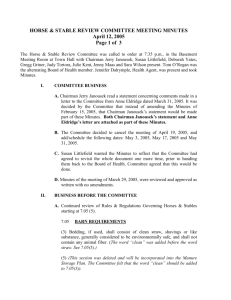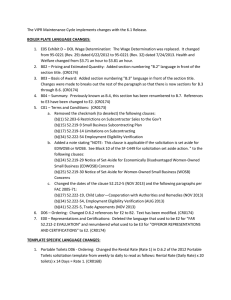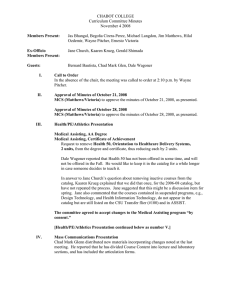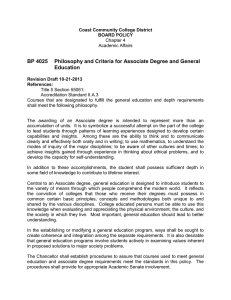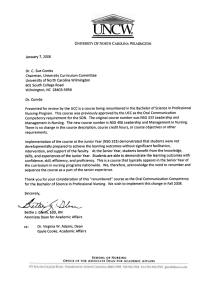S R C M
advertisement
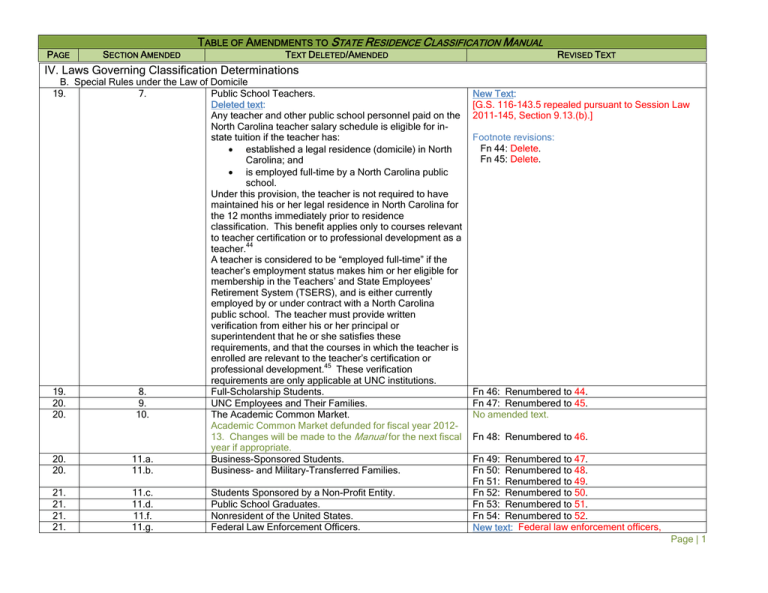
TABLE OF AMENDMENTS TO STATE RESIDENCE CLASSIFICATION MANUAL PAGE SECTION AMENDED TEXT DELETED/AMENDED REVISED TEXT IV. Laws Governing Classification Determinations B. Special Rules under the Law of Domicile 19. 7. Public School Teachers. Deleted text: Any teacher and other public school personnel paid on the North Carolina teacher salary schedule is eligible for instate tuition if the teacher has: • established a legal residence (domicile) in North Carolina; and • is employed full-time by a North Carolina public school. Under this provision, the teacher is not required to have maintained his or her legal residence in North Carolina for the 12 months immediately prior to residence classification. This benefit applies only to courses relevant to teacher certification or to professional development as a 44 teacher. A teacher is considered to be “employed full-time” if the teacher’s employment status makes him or her eligible for membership in the Teachers’ and State Employees’ Retirement System (TSERS), and is either currently employed by or under contract with a North Carolina public school. The teacher must provide written verification from either his or her principal or superintendent that he or she satisfies these requirements, and that the courses in which the teacher is enrolled are relevant to the teacher’s certification or professional development.45 These verification requirements are only applicable at UNC institutions. 19. 8. Full-Scholarship Students. 20. 9. UNC Employees and Their Families. 20. 10. The Academic Common Market. Academic Common Market defunded for fiscal year 201213. Changes will be made to the Manual for the next fiscal year if appropriate. 20. 11.a. Business-Sponsored Students. 20. 11.b. Business- and Military-Transferred Families. 21. 21. 21. 21. 11.c. 11.d. 11.f. 11.g. Students Sponsored by a Non-Profit Entity. Public School Graduates. Nonresident of the United States. Federal Law Enforcement Officers. New Text: [G.S. 116-143.5 repealed pursuant to Session Law 2011-145, Section 9.13.(b).] Footnote revisions: Fn 44: Delete. Fn 45: Delete. Fn 46: Renumbered to 44. Fn 47: Renumbered to 45. No amended text. Fn 48: Renumbered to 46. Fn 49: Renumbered to 47. Fn 50: Renumbered to 48. Fn 51: Renumbered to 49. Fn 52: Renumbered to 50. Fn 53: Renumbered to 51. Fn 54: Renumbered to 52. New text: Federal law enforcement officers, Page | 1 TABLE OF AMENDMENTS TO STATE RESIDENCE CLASSIFICATION MANUAL PAGE SECTION AMENDED TEXT DELETED/AMENDED Deleted text: A federal law enforcement officer whose permanent duty station is within North Carolina is eligible for the State resident community college tuition rate for law enforcement training courses. REVISED TEXT firefighters, EMS personnel, and rescue and lifesaving personnel whose permanent duty stations are within North Carolina are eligible for the State resident community college tuition rate for courses that support their organizations’ training needs. The State Board of Community Colleges must approve the courses designed to support law enforcement officers, firefighters, EMS personnel, and rescue and lifesaving personnel's training needs prior to the college awarding the State resident community college tuition rate.53 Footnote revision to 55: Renumbered to 53. Add, "S.L. 2011-145, Sec. 8.12.(d)." IV. Laws Governing Classification Determinations C. Tuition Waivers 21. C. Tuition Waivers. 22. 1. Survivors of Deceased Enforcement/Emergency Workers 22. 2. Families of Disabled Law Enforcement/Emergency Workers. 22. 23. 23. 23. 3. 4. 5. 6. Senior Citizens. Wards of the State. University Employees. High School Students. Deleted text: These programs include early college and middle college high schools, “Learn and Earn” online, cooperative innovative high schools operating in accordance with Part 9 of Article 16 of Chapter 115C of the General Statutes, Huskin’s Bill, and Concurrent (dual) enrollment. Deleted text from footnote 69: In 2010, the North Carolina General Assembly expressed its intent to eliminate tuition waivers for courses taken by high school students at community colleges. This action would take effect on July 1, 2011, but would not apply to students in cooperative innovative high school programs established pursuant to Fn 56: Renumbered to 54. Fn 57: Renumbered to 55. Fn 58: Renumbered to 56. Fn 59: Renumbered to 57. Fn 60: Renumbered to 58. Fn 61: Renumbered to 59. Fn 62: Renumbered to 60. Fn 63: Renumbered to 61. Fn 64: Renumbered to 62. Fn 65: Renumbered to 63. Fn 66: Renumbered to 64. Fn 67: Renumbered to 65. Fn 68: Renumbered to 66. New text: Tuition waivers are available for high school students taking eligible curriculum courses at community colleges. Eligible curriculum courses are those curriculum courses taken consistent with one of the following Career and College pathways: (1) a Career Technical Education Pathway, leading to a certificate or diploma aligned with one or more high school Tech Prep Career Clusters; (2) a College Transfer Pathway, leading to a college transfer certificate requiring the successful completion of thirty semester hours of transfer courses, including English and mathematics, for qualified junior and senior high school students; or (3) a cooperative Page | 2 TABLE OF AMENDMENTS TO STATE RESIDENCE CLASSIFICATION MANUAL PAGE SECTION AMENDED 23-24. 24. 7.a. 7.b. TEXT DELETED/AMENDED Part 9 of Article 16 of Chapter 115C of the General Statutes. Tuition shall continue to be waived for students in cooperative innovative high school programs. S.L. 2010-31, Sec. 7.24.(b). Other Community College Tuition Waiver Programs. a. General Waivers. Deleted text: (2) Full-time college staff members employed for a 9-, 10-, 11-, or 12-month term for one curriculum or extension course in the system per semester, as well as the summer term in the system;71 (3) Law enforcement officers employed by a municipal, county, or state law enforcement agency taking statedmandated Basic Law Enforcement Training ;72 (4) BLET trainees if a letter of sponsorship from a state, county, or municipal law enforcement agency is on file, are also exempt from tuition;73 (5) Patients in State alcoholic rehabilitation centers;74 (6) Clients of sheltered workshops; (7) Clients of adult developmental activity programs; (8) Students in Health and Human Services Development Programs; (9) Juveniles committed to the Department of Juvenile Justice and Delinquency Prevention.75 (10) [Renumbered to (3), text remains the same. See next column.] Individuals who are either unemployed, have received notification of a pending layoff, are working and are eligible for the Federal Earned Income Tax Credit (FEITC), or are working and earning wages at or below two hundred percent of the federal poverty guidelines taking human resources development courses and have signed a verification form acknowledging that they satisfy one of these factors.76 (11) Prison inmates taking courses tied to clearly identified job skills, transition needs, or both. Other Community College Tuition Waiver Programs. b. Specialized Training Course Waivers. Deleted text: The following groups are exempt from tuition at community colleges for specialized training courses only: REVISED TEXT innovative high schools program approved under Part 9 of Article 16 of Chapter 115C of the General Statutes.67 Footnote revision to 69: Renumbered to 67. Add, "S.L. 2011-145, Sec. 7.1A.(a)." New text: (2) Trainees enrolled in courses conducted under the Customized Training Program. (3) Individuals who are either unemployed, have received notification of a pending layoff, are working and are eligible for the Federal Earned Income Tax Credit (FEITC), or are working and earning wages at or below two hundred percent of the federal poverty guidelines taking human resources development courses and have signed a verification form acknowledging that they satisfy one of these factors.69 (4) Elementary and secondary school employees enrolled in courses in first aid or cardiopulmonary resuscitation (CPR). (5) Up to six hours of credit instruction and one course of noncredit instruction per academic semester for senior citizens age 65 or older who are qualified as legal residents of North Carolina. Footnote revisions: Fn 70: Renumbered to 68. Add, "S.L. 2011-145, Sec. 8.12.(a)." Fn 71: Delete. Fn 72: Delete. Fn 73: Delete. Fn 74: Delete. Fn 75: Delete. Fn 76: Renumbered to 69. Fn 77: Delete. New text: b. Specialized Training Course Waivers. Upon any of the following entities' request, community colleges shall waive tuition and registration fees for State Board of Community Colleges' approved courses Page | 3 TABLE OF AMENDMENTS TO STATE RESIDENCE CLASSIFICATION MANUAL PAGE SECTION AMENDED TEXT DELETED/AMENDED (1) Volunteer firemen; (2) Local fire department personnel; (3) Volunteer rescue and lifesaving department personnel; (4) Radio Emergency Associated Citizens Team (REACT) members where the REACT team is under contract to a county as an emergency response agency; (5) [No amendments or deletions made to this subsection.] Municipal, county, or State law-enforcement agencies; (6) All full-time custodial employees of the Department of Correction; (7) Employees of the Department of Correction’s Division of Community Corrections and employees of the Department of Juvenile Justice and Delinquency Prevention who are required to be certified under Chapter 17C of the General Statutes and the rules of the Criminal Justice and Training Standards Commission; (8) Trainees enrolled in courses conducted under the Customized Training Program; (9) Elementary and secondary school employees enrolled in courses in first aid or cardiopulmonary 78 resuscitation (CPR). REVISED TEXT that support that entities' training needs:70 (1) Volunteer fire departments. (2) Municipal, county, or State fire departments. (3) Volunteer EMS or rescue and lifesaving departments. (4) Radio Emergency Associated Citizens Teams (REACT) under contract to a county as an emergency response agency. (5) Municipal, county, or State law-enforcement agencies. (6) The Department of Correction for the training of full-time custodial employees and employees of the Department's Division of Community Corrections required to be certified under Chapter 17C of the General Statutes and the rules of the Criminal Justice and Training Standards Commission. (7) The Department of Juvenile Justice and Delinquency Prevention for the training of employees required to be certified under Chapter 17C of the General Statutes and the rules of the Criminal Justice and Training Standards Commission. To be eligible for waiver, the requested course must be on a specialized course list approved by the State Board of Community Colleges. Footnote revisions: Fn 78: Delete. Add to Fn 70: "S.L. 2011-145, Sec. 8.12.(a)(2)." IV. Laws Governing Classification Determinations D. The Statutory Grace Periods Following Loss of Resident Status 24. 1. Currently Enrolled Students. 25. 2. Students Who Are No Longer Enrolled. V. Procedures B. Initial Classification 27. 2. Fraudulent residence applications. C. Reclassification 28. C. Reclassification Fn 79: Renumbered to 71. Fn 80: Renumbered to 72. Fn 81: Renumbered to 73. Fn 82: Renumbered to 74. Page | 4 TABLE OF AMENDMENTS TO STATE RESIDENCE CLASSIFICATION MANUAL PAGE SECTION AMENDED TEXT DELETED/AMENDED REVISED TEXT D. Student Appeals to Residence Appeals Board 29. D. Student Appeals to the Appeal Board Fn 83: Renumbered to 75. Fn 84: Renumbered to 76. F. Appeals to the State Residence Committee 30. 2.a. Functions. Fn 85: Renumbered to 77. Page | 5
